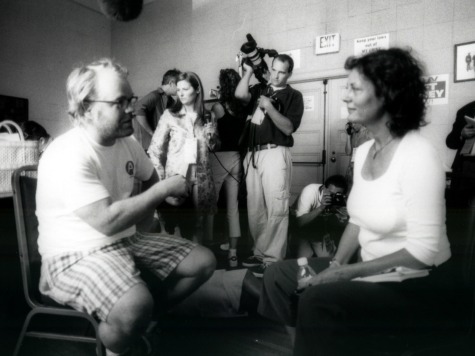
Philip Seymour Hoffman wasn’t one of those actors whose political identities overshadow their talent.
That’s a place where Tim Robbins, Susan Sarandon, John Cusack, Sean Penn and Barbra Streisand often dwell. Most movie goers had no idea how Hoffman, who died Sunday at the age of 46, voted in any given election. Off screen he leaned left and was critical of the current political process. He gave money to Sen. Al Franken and the Democratic National Committee through the years.
The actor focused his energies on his work, revealing his dazzling talents in films like Capote and Charlie Wilson’s War.
Hoffman did spend some of his celebrity capital on politics, named via a 2003 documentary called The Party’s Over.
The film, a sequel to The Last Party which focused on the 1992 presidential election, finds Hoffman playing the Everyman role down to his scruffy beard and casual attire. The film concentrates on the 2000 presidential election to take the pulse of our democracy.
The movie strives to be a nonpartisan look at the U.S. political system during a bare-knuckled presidential race, and it isn’t as overtly sided as a Michael Moore opus. Still, given the crush of progressive voices heard throughout–Noam Chomsky, Tim Robbins, Susan Sarandon, Bill Maher and Rep. Tom Hayden–the film’s biases are plain to see.
Big government and less corporations will help bring about a better America, the film’s underlying theme makes clear. The current system oppresses the people. And Chomsky is always right.
Party does give some gun rights advocates a voice, letting them speak their minds without mimicry. Center-right voices are in short supply all the same.
The film spends the bulk of its time with Hoffman nodding wisely as a series of progressive voices talk about the inequalities of the current political system. We see liberal protests at the Republican National Convention, far-left protests at the Democratic National Convention and listen as Pearl Jam’s Eddie Vedder sings the virtues of Ralph Nader.
We even watch a small group of senior citizens talk about the need for bigger government, a change from the film’s youth-heavy focus elsewhere.
Sadly, Hoffman doesn’t ask many tough questions of his progressive subjects, either lobbing the occasional softball or simply nodding as they list why the government must play a larger role in our lives.
The Party’s Over’s recurring theme is pessimism, that true change is elusive and the system is built to resist it.
The documentary ends with a one-sided view of the contentious Bush v. Gore legal battle, saying a biased Supreme Court handed the victory unfairly to George W. Bush.
Hoffman was a great actor whose gifts will be sorely missed. His political documentary, alas, added little new to the film canon.

COMMENTS
Please let us know if you're having issues with commenting.